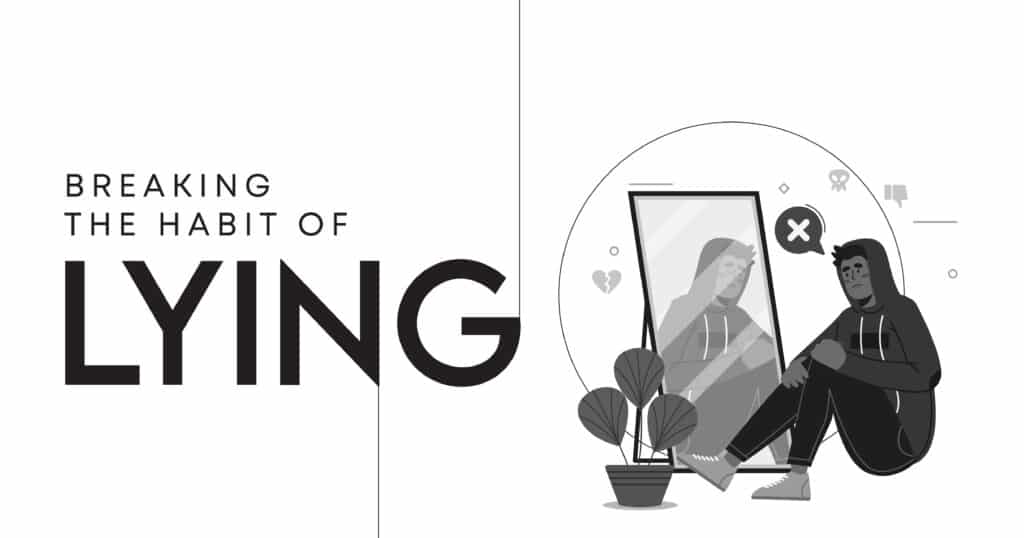While lying from time to time is normal, when it becomes compulsive, happens more and more often, and serves as a manipulation tactic, it is a serious problem you should not disregard. So, what causes dishonesty? And how to stop lying when it feels like second nature?
In this guide we will take a closer look at habitual lying, explore truthfulness techniques you should master and implement in your daily life, and learn how self-introspection can make you a more honest person.
Overcoming Dishonesty: Breaking the Habit of Lying
Lying is a very common occurrence – you may not notice how many times a day you lie to others even if all you do is omit certain details from your story or try to spare someone’s feelings. Sometimes, leaving lies behind is tough especially if you have a charming and persuasive personality – you can accomplish a lot by keeping the truth from other people. But once you are exposed, trust is damaged, your self-image is diminished, and others question your morality and integrity for a long time.
Nashville Mental Health
The Impact of Dishonesty on Relationships and Self-Esteem
Lying will lead to negative consequences that affect your perception of self and your relationships with people you care about:
| Negative Impact | Description |
| Erosion of Trust | When you are caught in a lie and it happens over and over again, it can shake the foundation of any healthy relationship and make others unsafe in your presence |
| Arguments | Naturally, other individuals will get mad upon learning about your dishonesty – whether you were fighting about something before or this is just the beginning of a conflict, lying takes a toll on your communication |
| Isolation | A liar is frequently left alone – a partner breaks up with them, a friend can no longer trust them, and a colleague prefers to avoid them in the workplace which causes the feelings of loneliness and isolation |
| Self-Deception | If you cannot stop lying and start believing your words, it may result in cognitive distortions and poor decision-making |
| Decreased Self-Esteem | A person who lies a lot often does not live up to the standards they created for themselves – a decline in self-confidence is very likely |
Compulsive Lying: Identifying the Root Causes
Dishonesty is a complex behavior which can be caused by numerous factors as well as a combination of them. While in some instances false statements have no valid reason, there may be underlying causes that must be ruled out before you judge the person in front of you:

| Cause | Description |
| Mental Health Issues | Lying is a common trait for people with several mental health conditions such as obsessive-compulsive disorder and bipolar disorder |
| Low Self-Confidence | Whether you crave social acceptance or your goal is to create a more favorable image of yourself for personal or professional gain, low self-confidence and lying might go hand in hand |
| Emotional Dysregulation | In case you are not in control of your emotions and your perception of situations is distorted, you may not know how to stop lying without further distress and negative consequences for yourself |
| Learned Behavior | If you have been surrounded by people who lied and got away with it especially when you were a kid or adolescent, it may show you that lying can be beneficial for you |
| Substance Abuse | Unfortunately, a person who relies on alcohol and drugs is more likely to lie whether they are trying to hide their addiction from other people or this behavior is influenced by the presence of substances in their system |
Techniques for Cultivating Truthfulness and Honesty
Luckily, you can always grow and develop as a person, and it relates to your habit of lying as well – here is how you can try to be more honest:
| Advice | Description |
| Do Not Leave Out Information | Lying by omission is also a form of deception – do not let others believe in false information when you withhold specific details from them |
| Keep Your Promises | Show others you are dependable and reliable – this is an essential step if you violated someone’s trust and you want to reconnect with them on a deeper level |
| Avoid Gossip | While gossiping and lying are not the same thing, spreading rumors about someone or talking about them behind their back may motivate you to lie especially if your own reputation gets better |
| Be Authentic | Being genuine, expressing your real emotions, and allowing others to know your true self is how you can build meaningful connections and know you are loved and respected for who you really are |
Strategies for Honesty Improvement and Building Trust
How to stop lying without external help? There are some effective tips you can bear in mind when you are trying to get better on your own:
- Be honest with yourself – embracing yourself with all your strengths and flaws is the first thing you should do to be more in touch with your inner self.
- Determine your values – decide what principles matter to you the most and adhere to them every day.
- Be straightforward. Tell the truth no matter how uncomfortable it may be and choose direct words instead of trying to deceive with false promises.
- Ask others to keep you accountable – people who talk to you every day can observe your behavior and tell you if they suspect you are lying.
- Be predictable. If your lying hurts people you care about, it is up to you to show them you can follow through on your commitments no matter how big or small they are.

Self-Awareness in Lying: Recognizing Patterns and Triggers
You can stop compulsive lying if you work hard on increasing your self-awareness. These days, not many people choose to observe their feelings, thoughts, and behaviors as an impartial bystander but it is one of the key qualities you can develop to benefit your personal and professional development.
Practice reflection and mindfulness, ask people you trust for feedback especially if you are trying to make amends with them, be open to criticism, and determine what values and principles will keep you going as the new version of yourself takes its first steps.
Nashville Mental Health
Learn More at Nashville Mental Health
Whether you suspect you are a compulsive liar and want to work through your issues by acknowledging, analyzing, and rectifying your behavior or the words and actions of a habitual liar caused you emotional pain, talking to a mental health specialist is a good idea.
Our team at Nashville Mental Health is at your service – reach out to us today, and we will address your concerns, offer you customized therapeutic options, and support your mental health journey in a respectful and welcoming environment.
FAQs
What are effective techniques for cultivating truthfulness and honesty in daily life?
Devote some time to self-introspection to find out why you have been lying in the first place, align your behaviors with values that mean a lot to you, avoid lying by omission, embellishment, and exaggeration, and own up to your mistakes as you apologize to others for excessive lying.
How can self-awareness help in recognizing patterns and triggers of lying?
When you look back at the events of the day or week or think about a particular conversation you had, you get to understand your own thoughts and feelings better – reflect on principles that guide you, observe the patterns you can notice, and consider how your choices affect others.
What strategies can improve honesty and foster trust in relationships?
If your partner or friend does not trust you and does not believe you can change, all you can do is to demonstrate consistency and commitment to openness, transparency, and reliability from now on. Show them they can trust you, do not forget about your promises, and be prepared to have difficult conversations about your emotional bond.
How can one identify and address the root causes of compulsive lying?
While you can pay closer attention to your behavior and practice mindfulness to deal with emotions and experiences that make you want to lie, therapy can be the most effective tool especially if lying was triggered by traumatic events or emotional pain you have not yet processed.
Nashville Mental Health
What are the essential steps for lying addiction recovery and achieving personal growth?
Admitting to yourself that you have a problem is the first step towards honesty. Take responsibility for your actions and words, sincerely apologize to people you have hurt, have regular therapy appointments if it is hard for you to cope with distress without deceit, and dedicate time to self-care and self-improvement activities.





